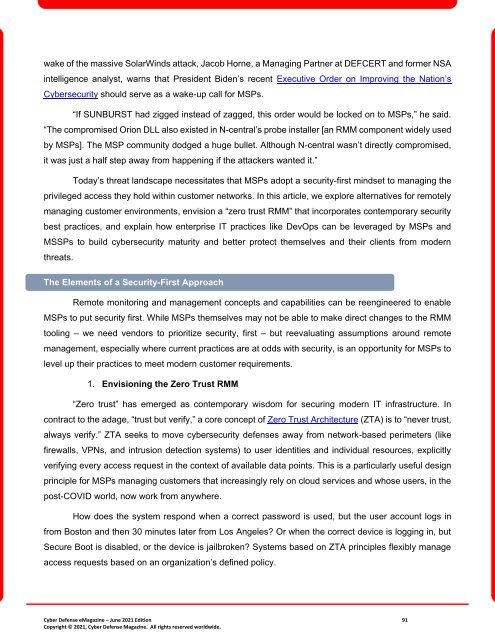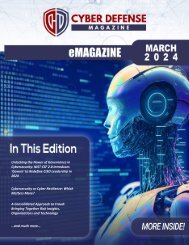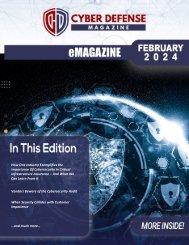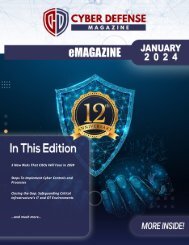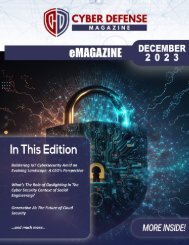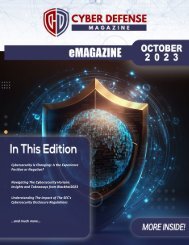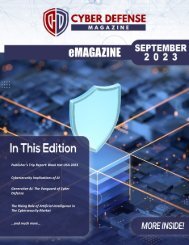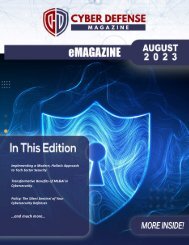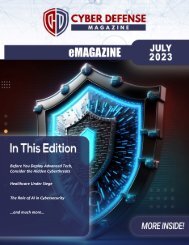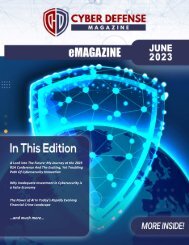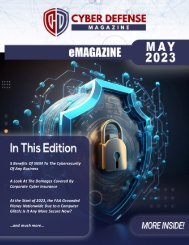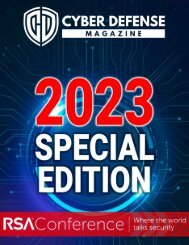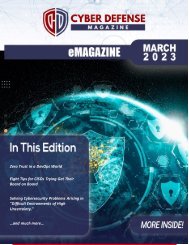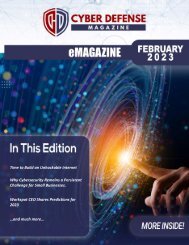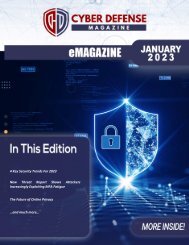Cyber Defense eMagazine June 2021 Edition
Cyber Defense eMagazine June Edition for 2021 #CDM #CYBERDEFENSEMAG @CyberDefenseMag by @Miliefsky a world-renowned cyber security expert and the Publisher of Cyber Defense Magazine as part of the Cyber Defense Media Group as well as Yan Ross, US Editor-in-Chief, Pieruligi Paganini, Co-founder & International Editor-in-Chief, Stevin Miliefsky, President and many more writers, partners and supporters who make this an awesome publication! Thank you all and to our readers! OSINT ROCKS! #CDM #CDMG #OSINT #CYBERSECURITY #INFOSEC #BEST #PRACTICES #TIPS #TECHNIQUES
Cyber Defense eMagazine June Edition for 2021 #CDM #CYBERDEFENSEMAG @CyberDefenseMag by @Miliefsky a world-renowned cyber security expert and the Publisher of Cyber Defense Magazine as part of the Cyber Defense Media Group as well as Yan Ross, US Editor-in-Chief, Pieruligi Paganini, Co-founder & International Editor-in-Chief, Stevin Miliefsky, President and many more writers, partners and supporters who make this an awesome publication! Thank you all and to our readers! OSINT ROCKS! #CDM #CDMG #OSINT #CYBERSECURITY #INFOSEC #BEST #PRACTICES #TIPS #TECHNIQUES
You also want an ePaper? Increase the reach of your titles
YUMPU automatically turns print PDFs into web optimized ePapers that Google loves.
wake of the massive SolarWinds attack, Jacob Horne, a Managing Partner at DEFCERT and former NSA<br />
intelligence analyst, warns that President Biden’s recent Executive Order on Improving the Nation’s<br />
<strong>Cyber</strong>security should serve as a wake-up call for MSPs.<br />
“If SUNBURST had zigged instead of zagged, this order would be locked on to MSPs,” he said.<br />
“The compromised Orion DLL also existed in N-central’s probe installer [an RMM component widely used<br />
by MSPs]. The MSP community dodged a huge bullet. Although N-central wasn’t directly compromised,<br />
it was just a half step away from happening if the attackers wanted it.”<br />
Today’s threat landscape necessitates that MSPs adopt a security-first mindset to managing the<br />
privileged access they hold within customer networks. In this article, we explore alternatives for remotely<br />
managing customer environments, envision a “zero trust RMM” that incorporates contemporary security<br />
best practices, and explain how enterprise IT practices like DevOps can be leveraged by MSPs and<br />
MSSPs to build cybersecurity maturity and better protect themselves and their clients from modern<br />
threats.<br />
The Elements of a Security-First Approach<br />
Remote monitoring and management concepts and capabilities can be reengineered to enable<br />
MSPs to put security first. While MSPs themselves may not be able to make direct changes to the RMM<br />
tooling – we need vendors to prioritize security, first – but reevaluating assumptions around remote<br />
management, especially where current practices are at odds with security, is an opportunity for MSPs to<br />
level up their practices to meet modern customer requirements.<br />
1. Envisioning the Zero Trust RMM<br />
“Zero trust” has emerged as contemporary wisdom for securing modern IT infrastructure. In<br />
contract to the adage, “trust but verify,” a core concept of Zero Trust Architecture (ZTA) is to “never trust,<br />
always verify.” ZTA seeks to move cybersecurity defenses away from network-based perimeters (like<br />
firewalls, VPNs, and intrusion detection systems) to user identities and individual resources, explicitly<br />
verifying every access request in the context of available data points. This is a particularly useful design<br />
principle for MSPs managing customers that increasingly rely on cloud services and whose users, in the<br />
post-COVID world, now work from anywhere.<br />
How does the system respond when a correct password is used, but the user account logs in<br />
from Boston and then 30 minutes later from Los Angeles? Or when the correct device is logging in, but<br />
Secure Boot is disabled, or the device is jailbroken? Systems based on ZTA principles flexibly manage<br />
access requests based on an organization’s defined policy.<br />
<strong>Cyber</strong> <strong>Defense</strong> <strong>eMagazine</strong> – <strong>June</strong> <strong>2021</strong> <strong>Edition</strong> 91<br />
Copyright © <strong>2021</strong>, <strong>Cyber</strong> <strong>Defense</strong> Magazine. All rights reserved worldwide.


